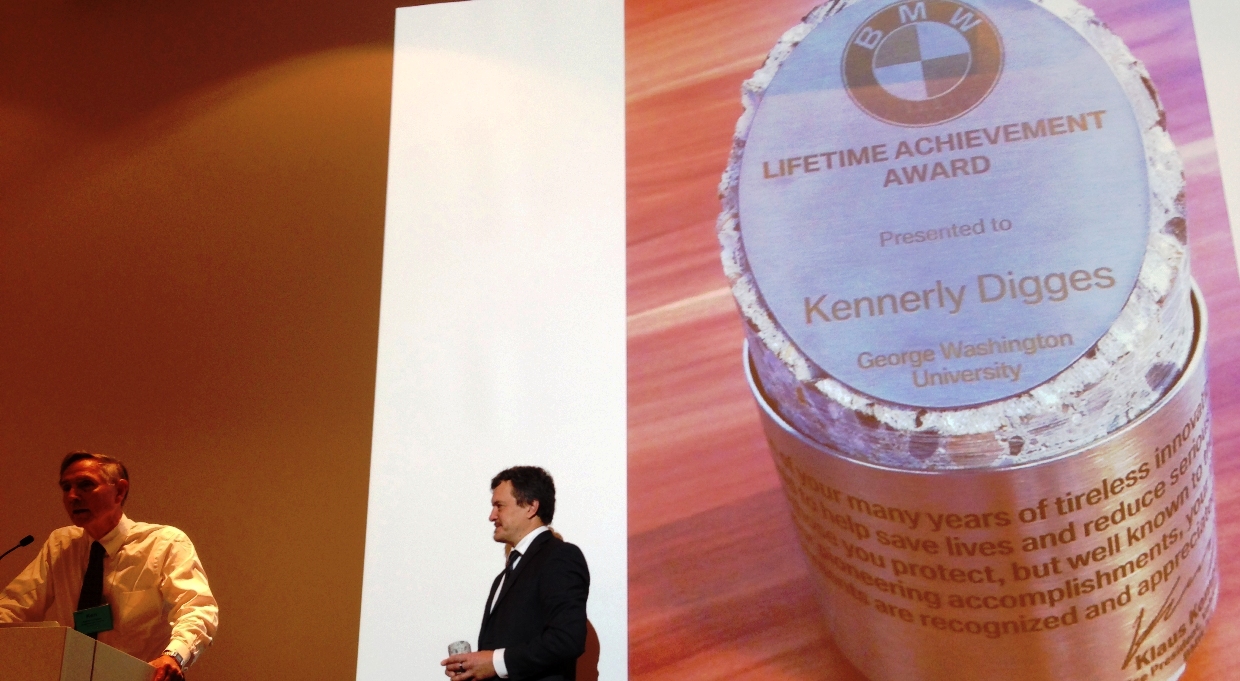Honour recognises outstanding services in the field of vehicle occupant protection – US scientist presented with the award during the Association for the Advancement of Automotive Medicine’s annual conference at BMW Welt in Munich.
Munich. With the presentation of the BMW Vehicle Safety Lifetime Achievement Award to US accident researcher Professor Kennerly Digges, the BMW Group recognises the scientist’s outstanding services to the development of technologies for improving vehicle occupant protection. Professor Digges conducts his research out of George Washington University in Ashburn, Virginia and is one of the world’s leading experts in the field of vehicle safety. His scientific work has laid important foundations for the implementation of the latest internationally recognised crash test processes and the development of state-of-the-art safety systems for vehicles. Professor Digges received the BMW Vehicle Safety Lifetime Achievement Award at the annual conference of the Association for the Advancement of Automotive Medicine (AAAM), currently being held at BMW Welt in Munich. The award was presented by Professor Klaus Kompass, Vice President Vehicle Safety at the BMW Group.
In his laudation, Professor Kompass underlined the outstanding progress in the field of occupant protection which can be credited to Kennerly Digges’ research work over the decades. Back in the 1970s and 80s, as a departmental director at the National Highway Traffic Safety Administration (NHTSA) in the USA, the scientist played a major role in channelling the latest findings from accident research into statutory regulations governing the inclusion of active and passive safety technology in vehicles. Moreover, he was the initiator of the New Car Assessment Programme (NCAP), whose vehicle classification system based on crash tests and a star rating represents the vehicle safety standard in many countries today.
Professor Digges also put in place essential groundwork for the Intelligent Emergency Call system that BMW now fits as standard in numerous models. This technology ensures the emergency services are alerted as quickly as possible and in a precisely coordinated manner in the wake of an accident. Professor Digges also developed the algorithm underpinning the vehicle information analysis that, in turn, provides information on the severity of a collision and the number of potentially injured occupants. BMW was the world’s first carmaker to introduce an automatic emergency call feature in the USA (in 1997) and, two years later, in Europe. In 2008 the system was updated to include automatic vehicle location and accident severity detection functions. Since then, Intelligent Emergency Call has ensured that, when an airbag is triggered, emergency services are alerted via a BMW Call Centre and relevant data for the emergency services is sent out. As well as the vehicle’s precise location and direction of travel, this information includes the model and colour of the car and all the data collected by the in-car sensors. It also helps to identify the type and severity of the collision. The deployment of the restraint systems, meanwhile, gives the emergency services an indication of the number of potentially injured people on board. Furthermore, frontal, rear-end, side-on and multiple collisions can be identified and distinguished from one another. Once alerted, the emergency services can use this data to rapidly coordinate the measures required to save lives.
The presentation to Professor Kennerly Digges was one of the highlights of this year’s AAAM annual conference. Since the Association was founded in 1957, this interdisciplinary panel of experts has dedicated itself to the research of technologies focusing on the avoidance and reduction of accidents and the medical treatment required as a consequence of accidents. Around 150 AAAM members from around the world have attended the latest gathering at BMW Welt. Included in their number are emergency doctors, emergency surgeons and medics from other specialist fields, as well as safety engineers, accident researchers and automotive development engineers. Numerous events give them the opportunity to share research findings and discuss the latest developments in medical science, automotive safety and traffic law.




































